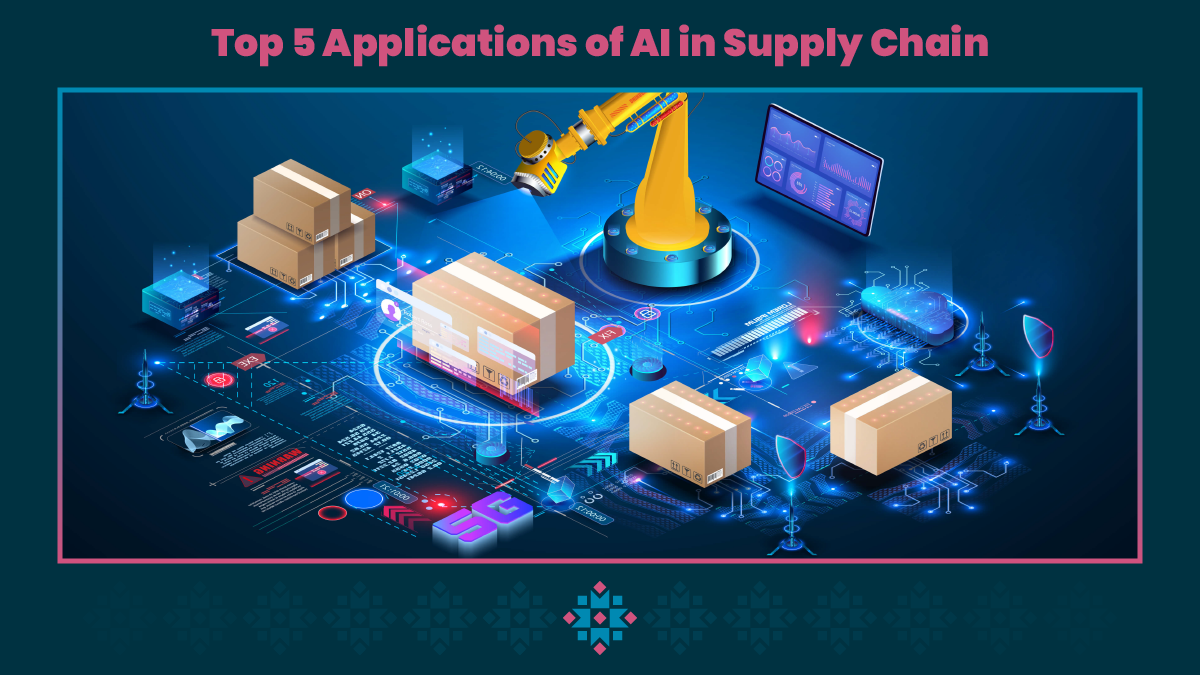The top 5 Applications of AI in Supply Chain:
In recent years, supply chains have become considerably more challenging to manage due to the constant data flow. The accurate forecasting of demand has a vital role in a business from any category to continue running smoothly and achieve sales and profit growth. Experts have relied on traditional forecasting methods and tools to predict demand. Although these methods have helped them a lot in reducing demand-supply mismatch, there is still much room for improvement. Read the article and learn about the Top 5 applications of AI in Supply Chain.
- 1 Demand Forecasting
Usually, businesses either underestimate or overestimate demand. This happens because the traditional models guess future demand based on historical data sales. However, these methods tend to reduce accuracy as past patterns change. They do not consider external factors that had an impact on previous demand, and they cannot apply them for future demands as well. On the contrary, AI-based solution looks at both external and internal factors to provide real-time data that can optimize processes. AI has the right set of tools and algorithms to predict complex and unpredictable for humans fluctuations in demand volumes and deliver accuracy. Those tools are proven to be effective in analyzing data quickly, providing timely guidance for forecasting seasonal demand. AI implementing will bring striking improvements in customer satisfaction, increase revenue, and reduce inventory expenses.
- 2 Slotting Adjustment
One example where the traditional methods fail, and AI delivers the best results is dynamic slotting. Slotting is an example of a complex problem that requires considering many factors and has many goals, which sometimes even compete. Traditional slotting methods require a customized model, extensive engineering, and regular data update. Whereas AI minimizes the need for engineering work as well as eliminates manual warehouse mapping and data inputs. AI calculates the travel time required for slotting and self-adapts as conditions change over time. Thus, proper slotting has an impact on productivity, accuracy, order cycle time, and storage quantity and capacity.
- 3 Staff planning and allocation
AI can provide a solution to other problems in the supply chain as well. One of them is staff allocation, which is vital to ensure that orders will get out on time. To avoid overstaffing or understaffing, and lower overtime managers have to decide on how to allocate staff properly. Usually, managers take labor allocation decisions based on a shift in the volume of work, deadlines, and productivity. The predictions, however, are based on the experience and the skills of the manager, leaving room for error. AI can be used to predict staff requirements and to estimate the deadline for an order. Moreover, AI can determine the best way to fulfill an order, while avoiding delays, through simulations.
- 4 Labor Management
Another important benefit of the AI approach is more effective performance management. Labor management systems and Engineered Labor Standards (ELS) have been used for years; however, AI has proven to be way more effective. ELS-based performance management requires intensive data collection and uses learning algorithms to estimate the required time for task completion. Meanwhile, the AI integration process is much easier, and the results are more accurate, as it automatically adjusts to changes. The AI solution is based on real-time performance data and considers multiple variables as the type of the task, starting location, quantity.
- 5 Suppliers Relationship Management
Companies working in the supply chain heavily depend on their partners and suppliers to maintain working efficiently. To continue a smooth working process, they need the right technology that will combine both strategic and sustainable factors, while managing risks. For the big warehouses, the suppliers’ network is complex. Choosing the right supplier for a specific product can be challenging having into consideration possible discounts, delivery deadlines, and other factors. AI will help in managing the huge datasets about the suppliers, the products that provide, and their condition so that the company can manage its orders in the most optimal way in terms of cost, time and risk.
Conclusion:
AI has already begun to change the supply chain industry by providing visibility into all aspects of the industry and delivering powerful optimization capabilities. AI-based solutions can make an intelligent supply chain that can produce higher quality products, by taking care of safety, managing inefficiencies, and decreasing risks.
AI is going to become even more influential as time goes on. This is not just a solution for today, but a better future for your business. Cosmos Thrace enables the integration of AI to the specific needs of your company while ensuring ease and haste in the delivery. Get in touch to discuss how we can help.


